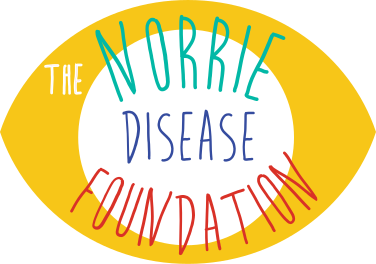What Causes Norrie Disease
Norrie Disease is caused by a genetic misprint (mutation) in the ND pseudoglioma (NDP) gene which is located on the X-chromosome. Norrie Disease is passed on in families in an X-linked recessive pattern of inheritance.
Females (XX) have two copies of the NDP gene, one on each of their two X-chromosomes. Males (XY) have only one copy on their single X-chromosome. Norrie disease occurs in males when there is a misprint in their single copy of the NDP gene. Otherwise healthy females can carry an altered NDP gene with the working copy on their other X-chromosome usually being enough to compensate for this, preventing them from developing the condition.
Women who are carriers of Norrie Disease have a 1 in 2 (50%) chance of passing the condition on to each son they have. Each of their daughters has a 1 in 2 (50%) chance of being a carrier of the condition.
When a man with Norrie Disease has children he will pass on his X-chromosome to all his daughters and so all (100%) daughters will be carriers of the disease. None of the sons of a father with Norrie Disease will inherit the condition from him as they will get their single X- chromosome from their mother.
The vast majority of mothers of a boy with Norrie Disease are carriers of the condition. Very occasionally Norrie Disease can occur due to a new spontaneous (de novo) mutation, without the mother actually being a carrier of the condition.
If the mother has had carrier testing for Norrie Disease and has not been found to be a carrier then the chance of her having another child with a Norrie gene alteration is low but still slightly higher than that of the general population. This is because of the very small possibility of there being a few egg cells in her ovaries that have a Norrie gene alteration (a situation known as germline mosaicism).
Genetic Services And Testing
Genetic testing methods change over time.
A genetic doctor from an NHS genetic clinic (www.bsgm.org.uk/information-education/genetics-centres) can arrange testing of the NDP gene where appropriate, review the inheritance pattern and provide up-to-date management advice.
Families are welcome to seek advice at various times of life from the genetic service or paediatrician. For example, when a child growing up with Norrie Disease or their siblings want more details, they could attend the genetic clinic to ask about the condition for themselves.
The information on these pages represents current understanding of Norrie Disease and has been taken from research to date and clinical findings of patients with Norrie Disease. However, much more research is needed to get a better picture of how Norrie Disease affects each individual.
As and when new research reveals more information, these pages will be updated.
